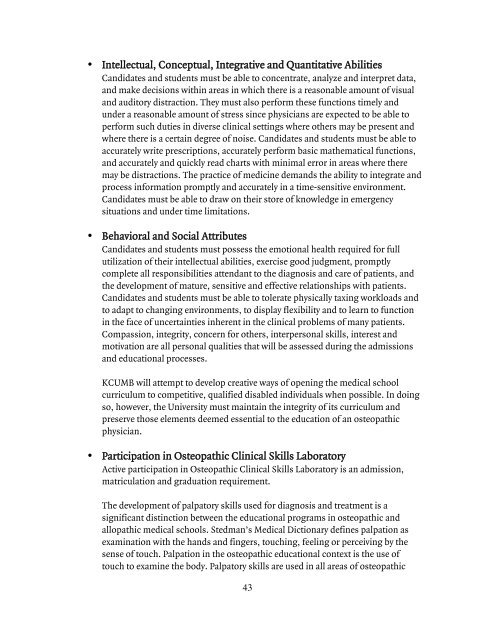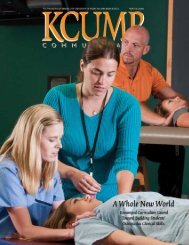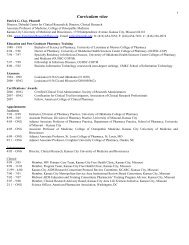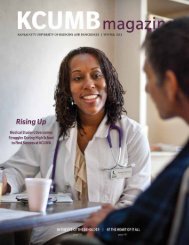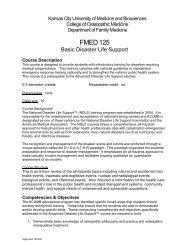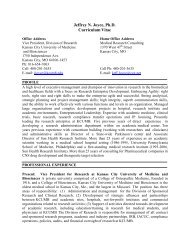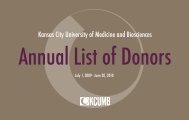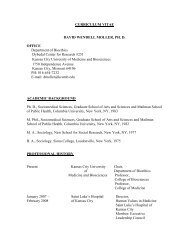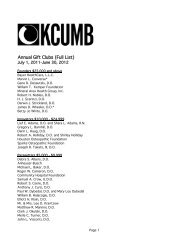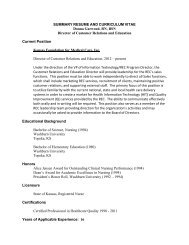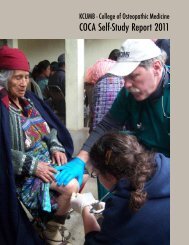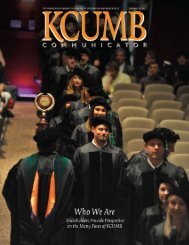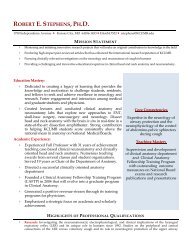2009-2010 KCUMB College Catalog - Kansas City University of ...
2009-2010 KCUMB College Catalog - Kansas City University of ...
2009-2010 KCUMB College Catalog - Kansas City University of ...
You also want an ePaper? Increase the reach of your titles
YUMPU automatically turns print PDFs into web optimized ePapers that Google loves.
• Intellectual, Conceptual, Integrative and Quantitative Abilities<br />
Candidates and students must be able to concentrate, analyze and interpret data,<br />
and make decisions within areas in which there is a reasonable amount <strong>of</strong> visual<br />
and auditory distraction. They must also perform these functions timely and<br />
under a reasonable amount <strong>of</strong> stress since physicians are expected to be able to<br />
perform such duties in diverse clinical settings where others may be present and<br />
where there is a certain degree <strong>of</strong> noise. Candidates and students must be able to<br />
accurately write prescriptions, accurately perform basic mathematical functions,<br />
and accurately and quickly read charts with minimal error in areas where there<br />
may be distractions. The practice <strong>of</strong> medicine demands the ability to integrate and<br />
process information promptly and accurately in a time-sensitive environment.<br />
Candidates must be able to draw on their store <strong>of</strong> knowledge in emergency<br />
situations and under time limitations.<br />
• Behavioral and Social Attributes<br />
Candidates and students must possess the emotional health required for full<br />
utilization <strong>of</strong> their intellectual abilities, exercise good judgment, promptly<br />
complete all responsibilities attendant to the diagnosis and care <strong>of</strong> patients, and<br />
the development <strong>of</strong> mature, sensitive and effective relationships with patients.<br />
Candidates and students must be able to tolerate physically taxing workloads and<br />
to adapt to changing environments, to display flexibility and to learn to function<br />
in the face <strong>of</strong> uncertainties inherent in the clinical problems <strong>of</strong> many patients.<br />
Compassion, integrity, concern for others, interpersonal skills, interest and<br />
motivation are all personal qualities that will be assessed during the admissions<br />
and educational processes.<br />
<strong>KCUMB</strong> will attempt to develop creative ways <strong>of</strong> opening the medical school<br />
curriculum to competitive, qualified disabled individuals when possible. In doing<br />
so, however, the <strong>University</strong> must maintain the integrity <strong>of</strong> its curriculum and<br />
preserve those elements deemed essential to the education <strong>of</strong> an osteopathic<br />
physician.<br />
• Participation in Osteopathic Clinical Skills Laboratory<br />
Active participation in Osteopathic Clinical Skills Laboratory is an admission,<br />
matriculation and graduation requirement.<br />
The development <strong>of</strong> palpatory skills used for diagnosis and treatment is a<br />
significant distinction between the educational programs in osteopathic and<br />
allopathic medical schools. Stedman’s Medical Dictionary defines palpation as<br />
examination with the hands and fingers, touching, feeling or perceiving by the<br />
sense <strong>of</strong> touch. Palpation in the osteopathic educational context is the use <strong>of</strong><br />
touch to examine the body. Palpatory skills are used in all areas <strong>of</strong> osteopathic<br />
43


